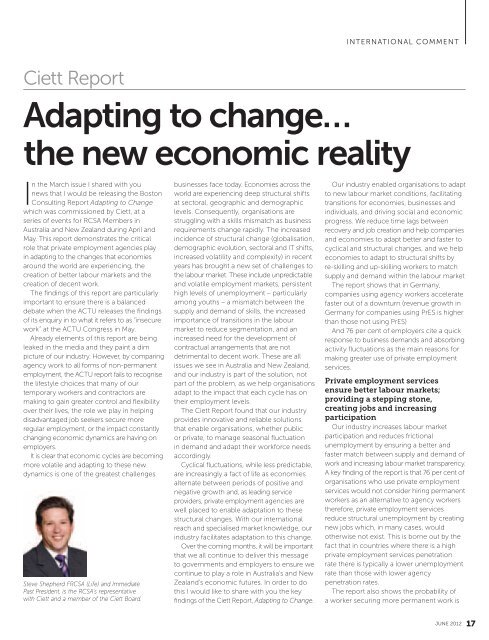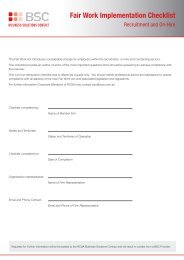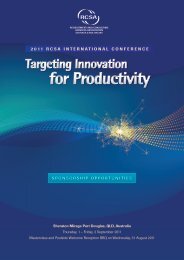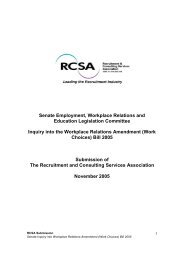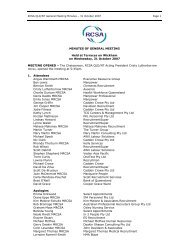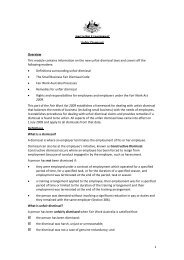June 2012.pdf - RCSA
June 2012.pdf - RCSA
June 2012.pdf - RCSA
Create successful ePaper yourself
Turn your PDF publications into a flip-book with our unique Google optimized e-Paper software.
international comment<br />
Ciett Report<br />
Adapting to change…<br />
the new economic reality<br />
In the March issue I shared with you<br />
news that I would be releasing the Boston<br />
Consulting Report Adapting to Change<br />
which was commissioned by Ciett, at a<br />
series of events for <strong>RCSA</strong> Members in<br />
Australia and New Zealand during April and<br />
May. This report demonstrates the critical<br />
role that private employment agencies play<br />
in adapting to the changes that economies<br />
around the world are experiencing, the<br />
creation of better labour markets and the<br />
creation of decent work.<br />
The findings of this report are particularly<br />
important to ensure there is a balanced<br />
debate when the ACTU releases the findings<br />
of its enquiry in to what it refers to as “insecure<br />
work” at the ACTU Congress in May.<br />
Already elements of this report are being<br />
leaked in the media and they paint a dim<br />
picture of our industry. However, by comparing<br />
agency work to all forms of non-permanent<br />
employment, the ACTU report fails to recognise<br />
the lifestyle choices that many of our<br />
temporary workers and contractors are<br />
making to gain greater control and flexibility<br />
over their lives, the role we play in helping<br />
disadvantaged job seekers secure more<br />
regular employment, or the impact constantly<br />
changing economic dynamics are having on<br />
employers.<br />
It is clear that economic cycles are becoming<br />
more volatile and adapting to these new<br />
dynamics is one of the greatest challenges<br />
Steve Shepherd F<strong>RCSA</strong> (Life) and Immediate<br />
Past President, is the <strong>RCSA</strong>’s representative<br />
with Ciett and a member of the Ciett Board.<br />
businesses face today. Economies across the<br />
world are experiencing deep structural shifts<br />
at sectoral, geographic and demographic<br />
levels. Consequently, organisations are<br />
struggling with a skills mismatch as business<br />
requirements change rapidly. The increased<br />
incidence of structural change (globalisation,<br />
demographic evolution, sectoral and IT shifts,<br />
increased volatility and complexity) in recent<br />
years has brought a new set of challenges to<br />
the labour market. These include unpredictable<br />
and volatile employment markets, persistent<br />
high levels of unemployment – particularly<br />
among youths – a mismatch between the<br />
supply and demand of skills, the increased<br />
importance of transitions in the labour<br />
market to reduce segmentation, and an<br />
increased need for the development of<br />
contractual arrangements that are not<br />
detrimental to decent work. These are all<br />
issues we see in Australia and New Zealand,<br />
and our industry is part of the solution, not<br />
part of the problem, as we help organisations<br />
adapt to the impact that each cycle has on<br />
their employment levels.<br />
The Ciett Report found that our industry<br />
provides innovative and reliable solutions<br />
that enable organisations, whether public<br />
or private, to manage seasonal fluctuation<br />
in demand and adapt their workforce needs<br />
accordingly.<br />
Cyclical fluctuations, while less predictable,<br />
are increasingly a fact of life as economies<br />
alternate between periods of positive and<br />
negative growth and, as leading service<br />
providers, private employment agencies are<br />
well placed to enable adaptation to these<br />
structural changes. With our international<br />
reach and specialised market knowledge, our<br />
industry facilitates adaptation to this change.<br />
Over the coming months, it will be important<br />
that we all continue to deliver this message<br />
to governments and employers to ensure we<br />
continue to play a role in Australia’s and New<br />
Zealand’s economic futures. In order to do<br />
this I would like to share with you the key<br />
findings of the Ciett Report, Adapting to Change.<br />
Our industry enabled organisations to adapt<br />
to new labour market conditions, facilitating<br />
transitions for economies, businesses and<br />
individuals, and driving social and economic<br />
progress. We reduce time lags between<br />
recovery and job creation and help companies<br />
and economies to adapt better and faster to<br />
cyclical and structural changes, and we help<br />
economies to adapt to structural shifts by<br />
re-skilling and up-skilling workers to match<br />
supply and demand within the labour market<br />
The report shows that in Germany,<br />
companies using agency workers accelerate<br />
faster out of a downturn (revenue growth in<br />
Germany for companies using PrES is higher<br />
than those not using PrES)<br />
And 76 per cent of employers cite a quick<br />
response to business demands and absorbing<br />
activity fluctuations as the main reasons for<br />
making greater use of private employment<br />
services.<br />
Private employment services<br />
ensure better labour markets;<br />
providing a stepping stone,<br />
creating jobs and increasing<br />
participation<br />
Our industry increases labour market<br />
participation and reduces frictional<br />
unemployment by ensuring a better and<br />
faster match between supply and demand of<br />
work and increasing labour market transparency.<br />
A key finding of the report is that 76 per cent of<br />
organisations who use private employment<br />
services would not consider hiring permanent<br />
workers as an alternative to agency workers<br />
therefore, private employment services<br />
reduce structural unemployment by creating<br />
new jobs which, in many cases, would<br />
otherwise not exist. This is borne out by the<br />
fact that in countries where there is a high<br />
private employment services penetration<br />
rate there is typically a lower unemployment<br />
rate than those with lower agency<br />
penetration rates.<br />
The report also shows the probability of<br />
a worker securing more permanent work is<br />
JUNE 2012 17


